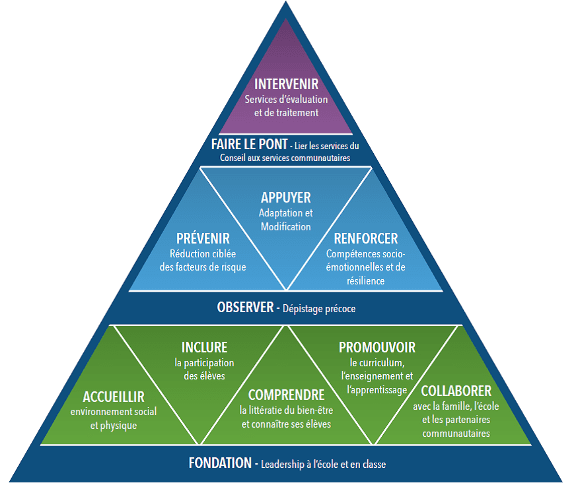The well-being and mental health of our school community is our priority; it is the essential condition for student learning and growth.
We promote a seamless and integrated model for student wellness and mental health. A tiered approach to support is a way to organize strategies and initiatives to ensure that they reach all levels of intervention in every school and classroom.
Level 1 (green): Good for All - Mental Health Promotion
Level 2 (blue): Required for some - preventive interventions
Level 3 (purple): Essential for some - more intensive therapy

Aurora Borealis CSDC schools promote mental health and wellness to their students in a variety of ways. They employ universal strategies that are beneficial to all, such as:
- Social skills sessions
- Positive Behavior Support
- Positive school climate
- Socio-emotional learning
- Mental Health Week
- Daily physical activity
- Classroom-based research programs such as Zones of Regulation
Level 1 interventions help staff members get to know their students and recognize the signs of distress that some students may be experiencing. This allows staff members to refer students in need to Level 2 or 3 services, such as:
- Small group research-based programs: such as FRIENDS Resilience, Zone of Regulation, Our Children and Stress, etc.
- Transition plans
- Applied behavioral analysis
- Individual positive reinforcement
- Social skills groups
- Behavioral plan
- Intervention plan
- Security plan
- Therapy with a health professional
What is mental health?
(video by Manulife):
Resources
- School Mental Health Ontario External link is working with school boards across Ontario to support student mental health. Here you will find many useful resources.
- The Youth Mental Health Resource Hub External linkhelps teens take care of themselves and those around them during a difficult time.
- Regional Crisis Line: We have all been in difficult situations. Something happens or a chain of events occurs that is beyond our ability to cope. We may have reached out to family and friends for support, overcome the situation and moved on, or we may find ourselves alone and unable to cope.
If you are going through such a situation or feel the need to talk to someone, contact the crisis line, a service available to all ages, 24 hours a day, 7 days a week. : 1 866-888-8988
- Youth, I'm listening External link provides professional intervention, information, resources and text support to youth in English and French. This service is available 24/7.
- Call 1-800-668-6868, text TALK to 686 868 or chat live at youthoute.ca External link
- Parlons suicide Canada a été créée pour offrir un service équitable et accessible à quiconque a besoin de soutien, peu importe son lieu de résidence au Canada, 24 heures sur 24, 7/7.
- Faites le 9-8-8 par téléphone ou par texto.
Here are some situations that can trigger a seizure in a person:
- the onset or recurrence of symptoms related to a mental illness ;
- difficulties with alcohol, drugs or other substances;
- difficulties in your relationships with others;
- a major life change or traumatic event;
- the feeling of being alone and isolated;
- loss of housing;
- the loss of a loved one and the grief associated with it;
- thoughts that run away and don't stop;
- suicidal thoughts and ideas or making a concrete plan to end your life.
Programs and services offered
Mental Health Promotion | Preventive interventions (universal or targeted) | Individual interventions | Crisis services | |
|---|---|---|---|---|
Social-emotional learning - Everyday Mental Health External link | Control Zones Friends Resilience Our children and stress Second Step | Counseling 1:1 NOSP 1 855 486-5037 Dilico 1 855 486-5037 or onlineExternal link Mental Health and Addiction Nurses (online reference External link) Walk-in counselling clinic - see schedule and detailsExternal link | Virtual 1:1 counseling with the TS du Conseil (contact your school principal to access the service) | 24 hours a day/7 days a week 1-888-269-3100 |
